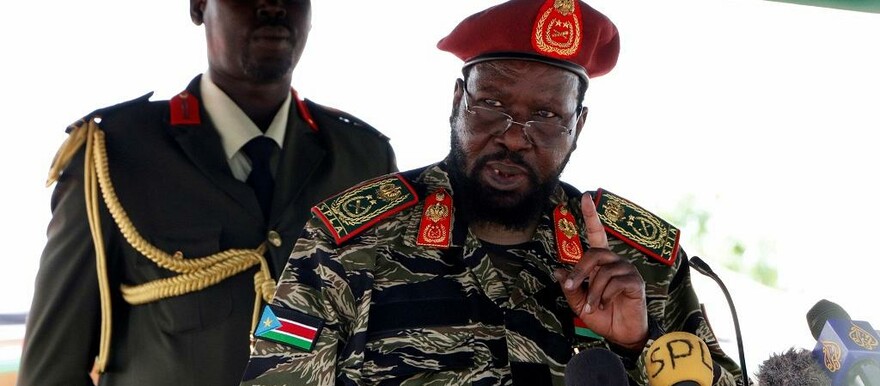President Kiir: Unification, graduation of forces not possible due to challenges

President Salva Kiir on Monday while closing the Governors’ Forum in Juba said that the unification and graduation of forces have stalled due to three major external and internal challenges.
He cited the arms embargo imposed on the country, inflated military ranks by the opposition peace partners, and a failure of the parties to reach consensus on percentage allocation in the planned unified army.
One of the vital parts of the agreement that has not been implemented is the consolidation of the military and the opposition and rebel forces into one national army. Financial shortfalls have prevented cadets from graduating and soldiers from being deployed. There have even been multiple reports of troops abandoning their posts in garrisons and training centers because of a lack of food and basic supplies.
President Kiir said, “Let me also comment on the challenges we have with respect to the implementation of Chapter 2 of the Revitalized Peace Agreement. There are three challenges impeding the faster implementation of security arrangements. One is an external challenge while the remaining two are internal challenges whose solutions are within our reach.”
He added that the first challenge is the arms embargo that has limited the country’s ability to procure arms for troops in training camps.
“We have repeatedly informed the UN system about the negative impact this has on the implementation of Chapter 2 of the Agreement, and all we have received in return are more conditions that do not recognize progress achieved so far,” President Kiir said. “As things stand, we will have no option other than to graduate these forces with sticks when the other two challenges I will speak to shortly are resolved.”
He added: “The second challenge comes from divergent views on the command structure of the unified army. Conventionally, army formation starts at the lowest level: from a squad all the way to a division. From this structural setup, it follows that the rank of commissioned officers must correspond with the levels of army units they are deployed to lead.”
According to President Kiir, some parties have submitted a list composed of senior officers, starting from colonel upward.
“If we accept such a submission, how will the leadership of a unified army be expected to maintain its coherence, accountability, and control of personnel?” he questioned. “We as parties to the agreement should get this right by addressing issues of inflated ranks and unreasonable demands when discussing ways of constituting the unified army command structure.”
The president said the third and final challenge is the failure of the parties to reach a consensus on percentage allocation of the new unified army among themselves.
“There are those saying that 45% of the unified army be allocated to other parties while the government takes the remaining 55%. To us, what is consistent with arrangements in the Revitalized Peace Agreement is the ratio of 60% to the government and the remaining 40% to other parties, Kiir said. “As you can see, these two internal challenges are not the making of one party. They emanate from the collective failure of the parties to see the bigger picture and reach a timely agreement on these issues.”
He advised those who are pointing fingers to examine the validity of their demands.
“Look at the consequences of your demands on the timely implementation of Chapter 2 of the Revitalized Peace Agreement. Let us be reasonable and work to reach an agreement on these two areas because they are critical for our country to exit from this cycle of violence,” Kiir said.
The president also told the governors and administrators that the bulk of their mandate centers on the restoration of law and order in their states and administrative areas.
“You all know without law and order at the lowest level in your respective states and administrative areas, all we have achieved since February 2020 will be reversed,” Kiir said. “Without law and order, we cannot hold credible elections, which is the end game of the Revitalized Peace Agreement. We will also not be able to repatriate our citizens who are still residing in refugee camps in neighboring countries.”
On tax collection, President Kiir said the concurrent taxing mandates between the national government and the state governments should not be taken as a pretext for unilateral, uncoordinated, inefficient, or ineffective revenue collection policies, strategies, and practices at any level of our government.